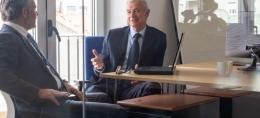Artificial intelligence: ‘Do no harm’
The use of artificial intelligence, particularly generative AI like ChatGPT, has grown rapidly in recent
years. As AI continues to evolve, companies and auditors have been incorporating machine-learning and other sophisticated technology into their operations.
According to David Fabricant, a senior vice president of American Express, AI can be helpful in preparing financial statements and reducing manual labor in a company’s accounting and finance departments.
GenAI can be used by businesses, for instance, to analyze accounting and tax regulations and to assist in the creation of accounting policies and implementation notes. According to Fabricant, among other uses for GenAI include the creation of financial statement footnotes, including data populating the footnotes, balance sheet account reconciliations, checking the general ledger for anomalies, aiding in the analysis of enormous amounts of data, and even aiding in the determination of fair values.
According to Brian Croteau, a partner at PricewaterhouseCoopers LLP, while AI has many applications, it should not be used to replace human judgment. He also underlined the importance of competent AI governance. At PwC, auditors are trained to ask audit company management questions on the use of AI and what the company is doing to address risks associated with AI, such as the implementation of suitable controls and the skills required of staff to utilize AI. PwC, according to Croteau, has also begun experimenting with machine learning and some components of AI.
Dane Mott, an accounting analyst at Capital Group Companies, agreed that AI is not the be-all and end- all, underlining the importance of appropriate levels of dependence.
He believed that it would be a long time before AI could be trusted in the financial reporting process. " Everything that it’s doing, we are going to have to verify; we are not at a point where trust is really an option" he continued.
Environmental issues
The International Sustainability rules Board (ISSB) established the first-ever sustainability disclosure rules last month, and the Securities and Exchange Commission (SEC) plans to finalize its own set of standardized requirements this fall. While some of the suggested standards are expected to alter as a result of feedback, there are needs both inside and outside the financial statements, including some type of assurance over specific data.
James Hunt, a corporate director, summarized conversations during a nonpublic breakout session,
saying that some SEIAG members discussed how climate change policies would effect other standards.
If noncompliance with laws and regulations (NOCLAR) "is eventually implemented," Hunt added, "then there will be a regulatory consideration there…, further considerations around going concern as we think about environmental disclosures and ultimately regulations that are promulgated."
In response to the SEC’s suggestion for 1% financial disclosure, he stated that the controls over such disclosure in the financial statements, as well as full attestation against reasonable or limited assurance, should be considered.
According to Hunt, there was also a brief discussion regarding significant audit matters (KAMs) on
climate change disclosures, such as estimates and assumptions used to make the disclosures, during the breakout session.
Declining Resources
Fewer students are studying accounting nowadays, and there is widespread concern that it will become increasingly difficult to find and keep accountants and auditors.
According to the Bureau of Labor Statistics, almost 300,000 accountants and auditors in the United
States have left their positions in the last two years, a 17% decrease. And as baby boomers retire, this migration is anticipated to accelerate. According to the AICPA, 75% of CPAs will retire or be close to retirement in the next 15 years.
Accounting bachelor’s degree students fell nearly 9% to around 52,500 in 2020, down from nearly 57,500 in 2012. There was a 50% drop in some universities.
While there are several possible causes for the fall, one of them could be the relatively low starting
salaries. Those who work in other finance, technology, or data science are likely to earn significantly
more than those who become accountants.
Preeti Choudhary, a University of Arizona accounting professor who graduated in 1999, stated that her beginning pay in 2000 was around $48,000. She has worked in the private sector. Her pupils in 2019 had an average starting salary of $5,000 more than she did. "That is not good enough," she stated.
The PCAOB, for its part, might do more to highlight and underline the critical role of accounting and
auditing in general.
“Sometimes the impression people have when they think about the PCAOB is all about enforcement and inspection and negative outcomes, and do you want to go to a profession that has all of this extra oversight, which of course we all know, is unfortunately necessary; we can’t get rid of it. But maybe there’s a way to also emphasize the positives,” Choudhary said. “What are some of the benefits of the good auditing outcomes or of good auditing that you’ve seen in your inspection process






















